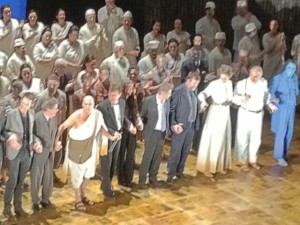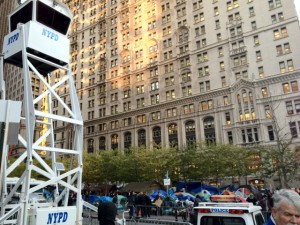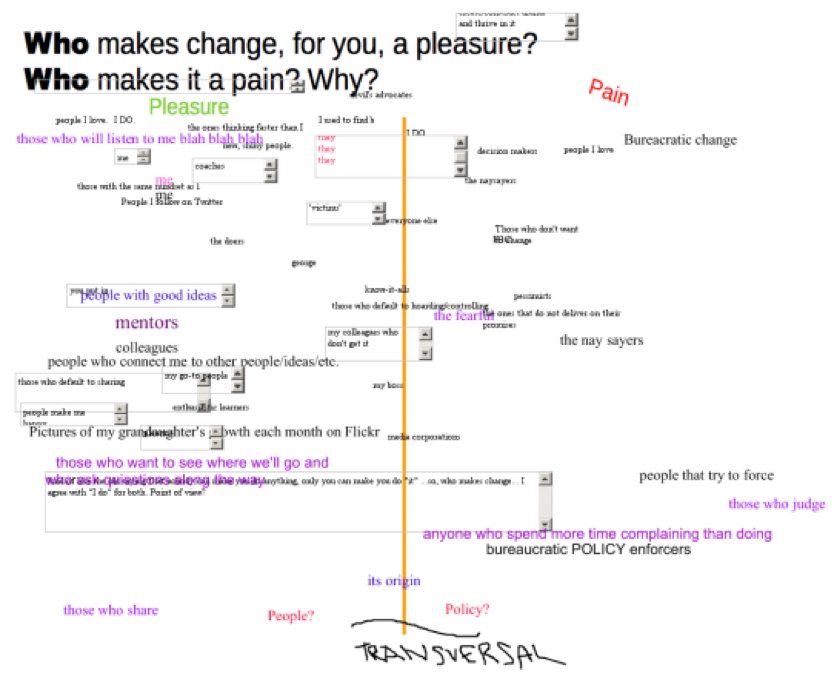We finished week 7 of the #change11 MOOC, this week with
Nancy White who spoke about the concept of a
Social Artist, someone who teaches and supports learners by using creative and sympathetic means to patiently encourage them to establish and follow their own goals while being connected with a larger and increasingly complex and chaotic world.
Jenny Mackness and I talked a bit about to what extent technology is also a component of social artistry, and I don’t think Nancy’s wonderful discussion (the first is
listed here, though I cannot find a link to the one at the end of the week) could have occurred without technology. Thinking about how
John Mak expanded on some initial work
Jenny presented, how could a social artistry develop without some connected or networked world (or am I perhaps mixing the active social artist with one that is developing and nourishing the role?)?
 Let me change direction for a moment and consider this in 2 events of this past Friday.
Let me change direction for a moment and consider this in 2 events of this past Friday.
Friday night I had the honor of being able to attend this season’s Metropolitan Opera premiere of Satyagraha, the Philip Glass opera about the life of Gandhi (or part of it at least, including elements in his earlier life in South Africa where he developed his worldview). With Glass’s style of repeating a few chords in ways that are soothing and hypnotic and energizing all at one, along with this dynamic production that used visuals and technology to tell the simple story in a way that brings it to life to a contemporary audience in a fresh way, I had a profound sense of how important Gandhi is as an historical figure and as an icon for standing up for one’s beliefs, supporting the freedom of action and self-government of an oppressed people. I saw this opera the last time it was at the MetOpera in 2008, and it affected me even stronger this time around. Perhaps I knew more about Glass’ intentions, his music, and the complicated production that tells a story without allowing us to refer to the libretto.
 Could Glass’s style add to social artistry, by offering a renewed sense of how historical action is just as relevant to our lives today? I kept thinking about Occupy Wall Street (OWS), something I have not been able to get my mind around (who ever heard of a protest without clear and simple demands?). Even when I was finally in the financial district in New York earlier on Friday, I snapped a few photos as a reminder, not knowing where or how this will develop. I did not initially make the connection between their work and Gandhi, though after seeing the opera later that night (yes, the irony between high art and its associated costs is not lost on me), I have since been thinking about the OWS protests that have spread around the world.
Could Glass’s style add to social artistry, by offering a renewed sense of how historical action is just as relevant to our lives today? I kept thinking about Occupy Wall Street (OWS), something I have not been able to get my mind around (who ever heard of a protest without clear and simple demands?). Even when I was finally in the financial district in New York earlier on Friday, I snapped a few photos as a reminder, not knowing where or how this will develop. I did not initially make the connection between their work and Gandhi, though after seeing the opera later that night (yes, the irony between high art and its associated costs is not lost on me), I have since been thinking about the OWS protests that have spread around the world.
None of this would have been possible without technology, and while the Met Opera’s production was planned long before OWS began, the connection between the two is uncanny. As a matter of fact, without hearing so much about OWS online for several weeks, I would not have even known it was happening. Leave it to corporate media outlets to not investigate its claims more fully, but that may be a sign of the protest itself and best left to more discussion at another time.
I wonder if that is also a role of a social artist, to bring an awareness of human experience and help others see connections that may easily be missed and then process them together to lead to action to improve elements of society? Could this be what Nancy White showed in the interactive slides and periods of silence she allowed and promoted in her 2 #change11 MOOC sessions this week?
 The Hot Seats series of online discussions preceding the 2012 Networked Learning Conference will have a synchronous discussion with Terry Anderson & Jon Dron (both at Athabasca University) on Sunday, November 20, at 1:00 MST via Blackboard Collaborate to begin their week of asynchronous discussion, “Nets, sets and groups. Different tools for different contexts.”
The Hot Seats series of online discussions preceding the 2012 Networked Learning Conference will have a synchronous discussion with Terry Anderson & Jon Dron (both at Athabasca University) on Sunday, November 20, at 1:00 MST via Blackboard Collaborate to begin their week of asynchronous discussion, “Nets, sets and groups. Different tools for different contexts.”



 I will confess to you, dear reader, that I am a
I will confess to you, dear reader, that I am a